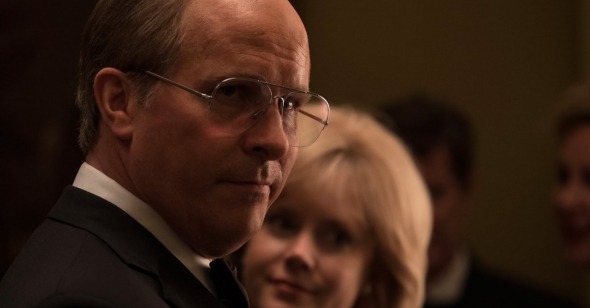11 Offenses of 2018
If you’re new to Reverse Shot in this, our 15th year of existence, and you’ve only just happened upon this annual diary of hate, we want you to know we’re actually full of love. We believe in the power of film to move people’s hearts and minds. Unfortunately it can also move bowels, as we’re usually reminded around this time of year. Groan! Below are eleven movies whose rottenness we could feel deep in our lovely bones. But try not to get dragged down into these murky depths. Immediately after reading this, go right back to our best-of list to rejuvenate thyself.
[Capsules by Nick Davis, Simran Hans, Eric Hynes, Demitra Kampakis, Michael Koresky, Violet Lucca, Tayler Montague, Adam Nayman, Justin Stewart, Chris Wisniewski, and Farihah Zaman.]
Vice
Just how awful is Adam McKay’s Vice? It’s not sufficient just to call out Christian Bale’s impression performance as Dick Cheney, which plays as The Dark Knight doing Emperor Palpatine doing Dick Cheney. Nor is the movie’s awfulness encapsulated by its parade of empty, SNL-level parodies (Sam Rockwell’s George W. is dumb! Steve Carell’s Donald Rumsfeld is…a bumbling Michael Scott-as-war-criminal), its glib “I’m telling you what to think” fourth-wall smashing asides that are neither amusing nor edifying, or its bizarre refusal to psychologize its deeply psychologizable central characters. Here is a movie that argues that Cheney is the übervillain of our time, a Machiavellian proponent of executive privilege who orchestrated a covert coup that resulted in the Iraq War, torture, and numerous other crimes against humanity. For McKay, this is the cinematic equivalent of shooting fish in a barrel. And yet, what exactly is Vice trying to say? As far as I can tell, after 135 endless minutes of tenuously stitched together fragments of scenes painfully lacking in insight or craft, the answer is—not much more than that Dick Cheney was a power-hungry, single-minded devil-in-a-suit with no ideological commitment beyond a desire to fuck the world. Such a vacuous approach to history is made all the worse by Vice’s stock footage of 9/11 and cutaways to waterboarding, which succeed only in exploiting some of the worst imagery of this young century to make its glib, facile points. The man at its center deserves the scrutiny of a more thoughtful, serious, or, frankly, competent biographer. In every possible sense, this movie fails to live up to its burden to history. Yet that may be the least of its problems. How is it, exactly, that a movie depicting a conspiracy to fool a nation into war manages to be such an insufferable bore? For that and that alone, McKay certainly deserves some kind of award. —CW
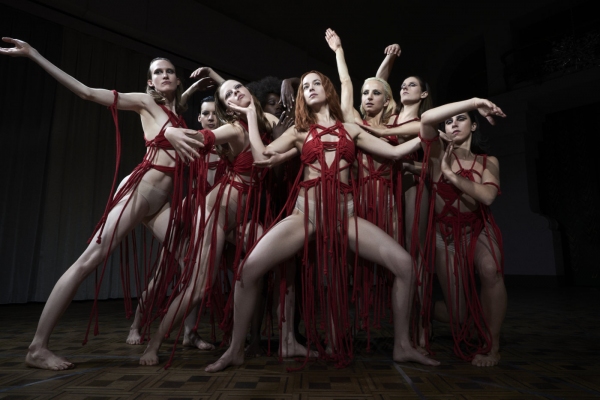
Suspiria
“Everybody got choices,” rapped E-40. I couldn’t get that hook out of my head while thinking about Luca Guadagnino’s Suspiria, a film that, whatever else you want to say about it, features some of the boldest choices imaginable—especially considering how easy it would have been to take the path of least resistance. Imitation is the sincerest form of flattery after all—see David Gordon Green’s Halloween (below). Guadagnino is playing a different game, swapping out giant chunks of Dario Argento’s giallo-style plotting, desaturating his predecessor’s blood-red color palette into a hazy shade of winter, and encircling the whole thing in an allegory for German postwar guilt and complicity as thick and impenetrable as the Berlin Wall itself (not to mention the tripling-down on Tilda Swinton’s ostensibly chameleonic mystique—suffice it to say she bats about .300). So: choices, not a one of which works or makes sense on a level other than ambition, a virtue made mendacious by bad execution and worse faith—unless it’s the other way around. It would have probably been less bothersome if Guadagnino had just Xeroxed Suspiria, as we would have been spared ballerinas peeing their leotards in agony and sententious monologues about concentration camps. (Richard Brody’s disgusted commentary on the latter was some of the year’s best film criticism.) Was there ever any chance that a film opening with a title card promising (forewarning?) us of “Six Acts and an Epilogue Set in a Divided Berlin” was ever going to be good? Nope. Is this the sort of movie bad enough to potentially put you off a talented filmmaker for the foreseeable future? Yup. —AN
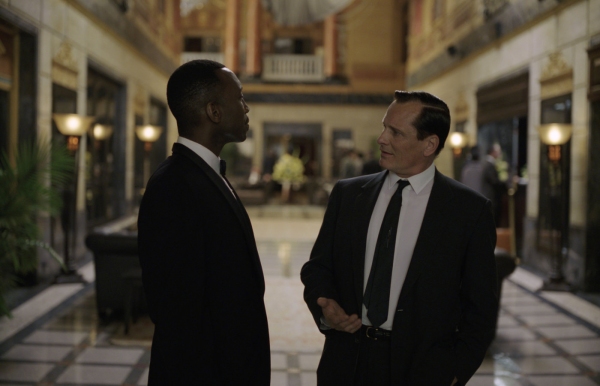
Green Book
Green Book shows its hand early on. Tony “Lip” Vallelonga (Viggo Mortensen) tells Dr. Don Shirley (Mahershala Ali), the Black pianist who has hired him as a chauffeur for a tour below the Mason-Dixon line, that he got his nickname growing up on the mean streets of the Bronx, a byproduct of his capacity to be a bullshit artist. This could be the thesis of the film, which is constantly bullshitting us—mostly into believing it’s truly interested in race relations. Instead, it’s a textbook White savior film, inching us ever closer to Vallelonga’s racist redemption arc. Don’s primary role is to end up in racist situations that allow Tony to eventually be a little more tolerant of Black people—and maybe White viewers will be by the end of it as well. These would-be teachable moments make it so that Don takes the backseat in his own story. It’s worth asking why Ali is winning Best Supporting Actor awards in a story ostensibly about his character’s experiences. The fascinating aspects of his life, including his queerness, feel as though they were just checked off as a courtesy. A Black Queer filmmaker could’ve done Dr. Shirley justice without needing to tell it through the story of his babysitter/driver. Though Ali carries the film—much as he’s had to unfairly carry the burden of its proven inaccuracies—his approach feels in the vein of Sidney Poitier, who spent much of his early career playing the Dignified Black Man. The DBM tends to exhibit no real traces of anger until a late-film monologue in which he airs his grievances about his position in society, to appeal to White consciousness, only to return to his poised, head-held-high, non-threatening ways. The idea that “dignity always prevails,” a line in the film, reinforces the notion of Black exceptionalism. There’s nothing radical about Green Book, but there’s also nothing smart or entertaining about it either. —TM
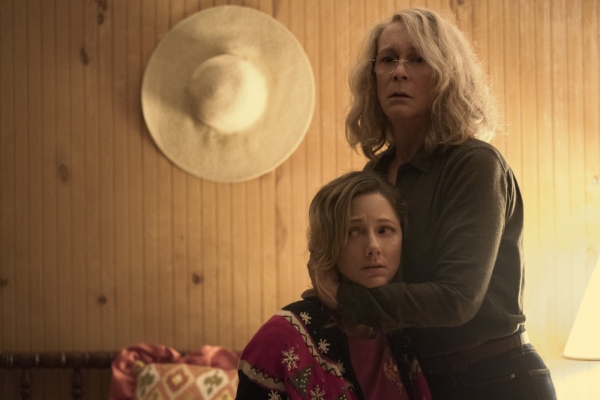
Halloween
The justification for Halloween’s placement on this year’s Offenses list should be simple enough: for a horror film, the horrors are in scant supply. But it goes beyond that. What’s even more offensive about David Gordon Green’s 2018 entry into the franchise are its vacuous attempts at fan service, its forced self-referential dialogue and clunky attempts at tongue-in-cheek humor, and its overall glossy, deflated, and superficial aping of John Carpenter’s scrappy and potent classic. In the original, Carpenter didn’t have to rely on gore—he knew how to burrow under our skin, invoking dread and terror with ambience and spatiality. No longer an inscrutable, infallible boogeyman, Michael Myers is reduced to a generic, somnambulating slasher. Throughout, it’s hard to understand what exactly Green and co-screenwriters Jeff Fradley and Danny McBride were going for: a work of Scream-like self-aware irony (the script’s desultory topical references, such as the British true-crime podcasters, come across more like Dad-jokes straining for pop-culture relevance); a terrifying action rollercoaster; or a nightmarish drama about the legacy of Laurie Strode (Jamie Lee Curtis) and how familial trauma can be passed down through the generations. It’s on the latter point that Green, Fradley, and McBride really drop the ball. The three heroines have no depth, shuffling along the rote narrative contours of family conflict until at last they band together to fight the bad guy, so that Laurie’s paranoia is vindicated in the eyes of her estranged daughter. Even the film’s final, admittedly strongest, set piece reeked of pandering: a transparent bid at fist-pumping, feminist revenge fantasy. —DK

Ocean’s 8
The Ocean’s franchise exists because the films can be counted on for a good time; roguish lads just this side of the charming/smug divide, out on the town, doing what they do best and doing it with gusto. The big reveal may not always make sense, but the crooks—and the actors who portray them—are obviously having a ball, and that is infectious. So why, in the criminally boring “gender-flipped” (just consider the stale taste of that commonly used descriptor) latest in the series, aren’t the female characters allowed to take pleasure in their pursuits of happiness? Would seeing them visibly enjoying themselves undermine our ability to believe in their professional competence? Director Gary Ross and the makers of Ocean’s 8 don’t seem to trust that audiences will believe a complex heist could be pulled off by a bunch of broads. The film may not be plagued by representational invisibility, but its presumption that a non-male cast must spend most of the narrative proving themselves is equally problematic, not to mention disturbingly familiar to working women. The film seems so desperate to convince us that women are capable of the same capers as their male counterparts that Ocean’s 8 feels more like reading a manual on the management of a heist than being part of one, wasting precious zinger minutes on tedious explanations of every mouse trap. And to those tempted to protest the film’s inclusion on the RS naughty list on the grounds of its luminous performers, I say: that is exactly the point. These women deserve better. Mindy Kaling, Awkwafina, Helena Bonham Carter deserve better. Rihanna deserves better. The cast—forming the kind of viscerally satisfying, precisely calibrated collect-’em-all archetypes typically reserved for manufacturing K-Pop bands—is undeniably fabulous, casually diverse, and well suited to their roles; watching them shift the woman's typical place in heist movies away from moll or sidekick, and subvert of the very essence of word “cocky” while doing it, should have elevated the series. Instead, in this queasy tribute to the fight-like-a-man dark side of second-wave feminism, some of our brightest stars are dimmed by the lame patriarchal Hollywood machine that still fundamentally lacks faith in lady rascals or the audiences that come to see them shine. —FZ
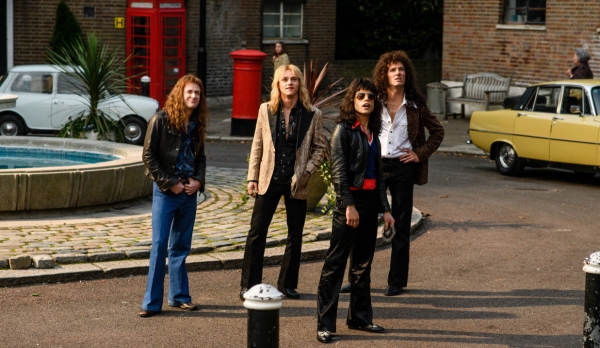
Bohemian Rhapsody
Is this the real life? Is this just fantasy? Bryan Singer or Dexter Fletcher or whoever “directed” Bohemian Rhapsody shows neither the craft nor the will to hit either of those targets. Instead, this movie achieves the impossible in exactly one way: proving you can travesty the already-moribund format of the jukebox musical. The script stinks of fishy contrivance, packing a romantic reunion, a family rapprochement, and a triumphant Live Aid performance into one big day. Even after his HIV diagnosis (delivered two years early, for plot convenience), Rami Malek’s Freddie Mercury looks as startlingly hale below the neck as he looks prosthetically absurd above it. The production plays imitation games with Freddie’s sexuality, catering less to a censorious audience than a blandly tolerant one that acknowledges queerness but prefers not to delve. By paying such anodyne, awkward lip service to Freddie’s desires, the film not only risks erotic perjury but undercuts its putative portrait of a protean figure, as lusty and unruly in life as on record. But if Bohemian Rhapsody is bad at being a queer movie, it’s even worse at being—well, a movie. The other band members age at remarkably different rates, say nothing of interest, and spend a decade searching for a single decent wig. The production values rival those of Toonces the Driving Cat; even routine dialogue scenes are blatantly green-screened. “But the music!” its fans insist. Hot tip: for an identical price, you could buy Queen’s Greatest Hits on iTunes and crank that shit up or you could hear those same 58 minutes of your favorite songs log-jammed amongst an hour’s worth of dramatic [sic] reenactments with all the verve and texture of forced ads on YouTube. —ND
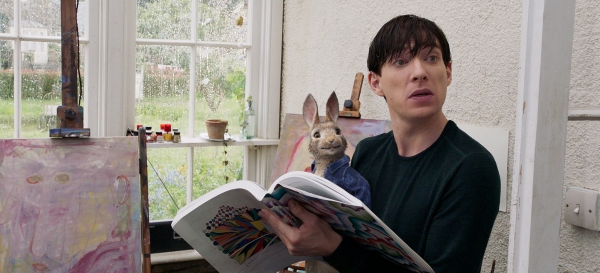
Peter Rabbit
According to the British Board of Film Classification, the U.K.’s most complained-about film of 2018 was Will Gluck’s Peter Rabbit. Not for the film’s mild homophobia (an unfunny joke is built around a carrot, shoved unceremoniously into Old Mr. McGregor's bottom). Not for its confused soundtrack choices (as many as five different Vampire Weekend songs feature). Not for its geographical inaccuracies (exiting the underground at Piccadilly Circus for Buckingham Palace? I can think of four tube stations closer). Not for the cursed image of Peter twerking (Paddington Bear would never), his face CGI-ed to resemble, with sinister likeness, James Corden’s smug, smirking own. No, incensed viewers berated this crass adaptation of Beatrix Potter’s gentle turn-of-the-century children's books for its needlessly nasty depiction of an allergic reaction to blackberries, maliciously induced. Domhnall Gleeson’s bramble-weary Young Mr. McGregor is pelted with the offending fruit and sent into anaphylactic shock while Peter and his fellow rabbits chortle from the sidelines. A handy EpiPen (!) means that McGregor springs back to life, but in that moment, a part of me withered and died. “I'm whimsical and hilarious!" insists McGregor; the film does the same, a prelapsarian vision of pre-Brexit Britain as vainly imagined by a team of studio execs. —SH
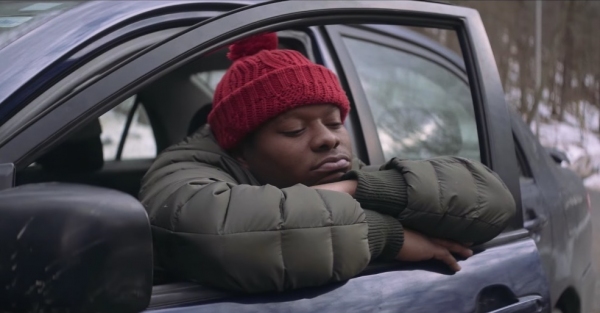
Tyrel
Cultural memory continued to shrink in 2018, which is perhaps why this trifling comedy of discomfort, which plays like an extended episode of The Real World, was frequently touted as “the next Get Out” at Sundance. Though the film is intended to be a cringe-inducing document of a weekend of racial microaggressions, the majority of the action seems to be more a series of strung-together acting exercises than shit guys do when they’re just bein’ dudes. The “games” the group of white friends enjoy playing alienate Tyler, the lone black guy, played by Jason Mitchell, who presumably has not taken an improv 101 course and cannot successfully “yes and…” his way into their circle, so he does what anyone stuck in this lousy, isolating situation could do: sits in furious silence while everyone else laughs, pretends to fall asleep early, and gets blackout drunk. Because director Sebastian Silva doesn’t have anything of substance to say about race and is not invested in Tyler’s perspective in any meaningful way, he’s content to project profundity onto the proceedings with ham-handed symbols like a large, inflatable snowman lawn decoration (you can almost feel the director’s arm on your shoulder, shaking you and shrieking, “Get it? It’s a BIG, WHITE MAN!”), rooms decorated in all white, and an impromptu dance party to R.E.M.’s “It’s the End of the World as We Know It.” Arriving a day late and a dollar short to the discourse about race in the United States, Tyrel doesn’t show what happens when people stop being polite and start getting real, but rather what happens when the people who should shut up and listen continue to talk. —VL
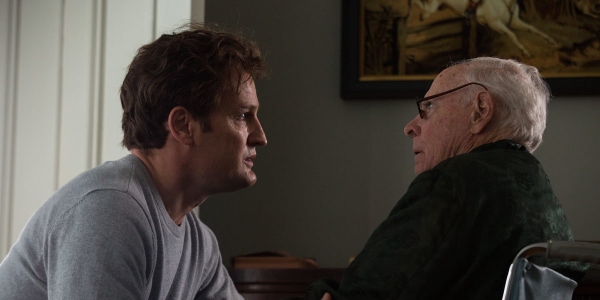
Chappaquiddick
It would take a journalist with more time and a higher word count to follow the money and ascertain why this movie was made, and why now, but the surfacing of this Kennedy-smearing exhumation at such a politically fraught time smacks as fishier than the depths of Poucha Pond. That's where, on Chappaquiddick Island, Massachusetts in 1969, Ted Kennedy drove his Oldsmobile into the drink, resulting in the drowning death of passenger and RFK campaign holdover “boiler room girl” Mary Jo Kopechne, which took the senator ten hours to report. The two screenwriters have light writing resumes (one’s a Simpsons animator) and the nominal producer/distributor credits raise no red flags, so it’s best not to speculate about the same conspiratorial tangles in which the film trades—here, deep-state fixers say things like “He’ll know people in government who are sympathetic to the cause” and “We’ll tell the truth, or our version of it,” and a wheezing, stroke-ridden, Vader-like Joe Sr. gasps “alibi!” on the phone. When head cover-upper Robert McNamara (Clancy Brown) jokily suggests that the Apollo moon landing that happened two days after the incident is a false flag distraction, the stretch is a ploy to normalize the conspiracy-minded reachings elsewhere. Later, there’s a montage of various characters watching the moon landing (a trope in dire need of retirement), during which one of Ted’s mop-topped tots actually says to him, “Uncle Jack could do anything, huh, Dad?”, which ties into the film’s lazy gambit of identifying the senator’s hamartia as a family-bred inferiority complex. When Ted (a bulkily bland Jason Clarke, also in 2018’s primary Apollo film, First Man) is flying a Rosebud-substitute kite on the beach, honorary Kennedy cousin (and the story’s dubious locus of conscience) “Old Joey” Gargan (Ed Helms) sighs, “You’ve been like this since Bobby died.” Employing the now-default aesthetics for this kind of material (secondhand muted Zodiac hues and minor key piano tinkling), director John Curran has the gumption to conclude Chappaquiddick with a close-up of Clarke’s eyes in old-face, seemingly reflecting on the tragedy of it all, like it’s The Godfather Part II. —JS

Solo: A Star Wars Story
A Star Wars movie came out in 2018. I watched it. Or I’m pretty sure I did. I mean, I definitely did. But if I’m going to be completely honest with you, I have nearly no recollection of what happened in the movie called Solo: A Star Wars Story. I just read the plot description online and, sure, if you say so. I remember liking the meet-cute between Han Solo and Chewbacca the Wookiee, and Woody Harrelson was in it, and Donald Glover was definitely in it too. But it’s never a good sign when I remember more about the stories behind the making of the film than I do about the film itself, when I form more solid opinions about the embattled production (calling in Ed TV's Ron Howard to save your space lark isn't exactly a come-on) than I do about whatever battles I supposedly witnessed in the movie. It’s over a year after the release of Star Wars: The Last Jedi and dudes are still fighting about what transpired, still gnashing teeth over how their beloved Luke Skywalker was characterized. Meanwhile six months after the release of Solo and… The kid from Rules Don’t Apply played Harrison Ford and he seemed fine, I guess, nbd. Didn’t they gamble over the Millennium Falcon? Cool. The palette was really dark, but the promotional posters were bright and cheery. There was some comedy, some action, some love interest, some toys—the four quadrants were dutifully honored. But what else? A Star Wars movie came out, sucking all the air out of the room as it will, and half a year later it’s like it never happened. So while the movie wasn’t memorable or frankly interesting enough to be actually offensive, making a $300 million dollar production featuring some of the most beloved characters of the last half-century that’s this blandly inconsequential felt worse. —EH
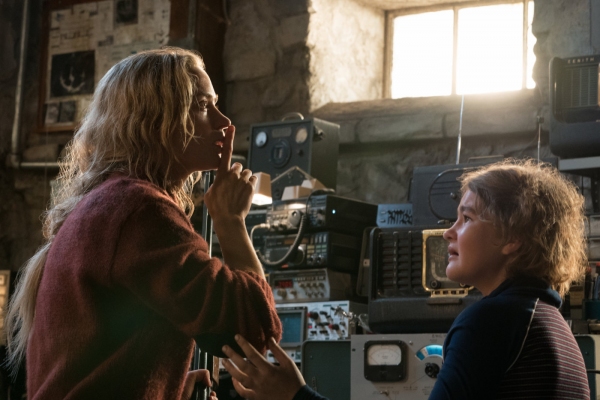
A Quiet Place
This postapocalyptic horror blockbuster from the director of The Hollars has been lauded for the skilled execution of its tight premise: the monsters kill based on sound, necessitating largely dialogue-free action and the kind of visual storytelling that even dummies can notice as “visual storytelling.” And its big box-office allowed Hollywood to enshrine John Krasinski with the requisite hometown-boy-makes-good laurels usually reserved for true film artists like Ben Affleck. Because it’s so very stupid, it’s tempting not to take A Quiet Place seriously at all. (Gotta love that basement whiteboard laying out the details for all of us unable to follow basic exposition: CREATURE... BLIND... ATTACK SOUND... SURVIVE... WHAT IS THE WEAKNESS?) Yet more disturbing than its silly spiders and predictable suspense set pieces was its sly survivalist conservatism. The film’s beautiful, athletic, white clan’s tenacity celebrates a very particular kind of American family values, and this is reflected in the centerpiece dilemma: Emily Blunt’s Evelyn Abbott is pregnant, and thus will have to give birth without making a peep. Aside from the fact that the eventual sequence itself—of Evelyn delivering the baby while agonizing alone in a bathtub, as the monsters stalk outside the door—is a cheap cop-out (the film just cuts away and the miraculously silent delivery has been accomplished), it’s telling that the film never once questions, wrestles with, or acknowledges Evelyn’s choice to have this baby. Forget that the squealing infant would be a clear and instant threat to the lives of each of the family members . . . what sort of world are they bringing this life into? We’re trained to think that only films that flaunt their politics (like the ineffective cartoon Vice) are “political,” but the cagey A Quiet Place is more insidious. In a Hollywood Reporter interview, Krasinski—whose recent filmography, I came to learn, includes the Michael Bay Benghazi actioner 13 Hours and the series Jack Ryan, based on the character created by neocon Tom Clancy—said, “This is a movie about family. It’s a metaphor about what family is and the extremes you go to as a parent to protect your kids.” Aside from the questionable use of “metaphor,” he here indicates that the ideologically dodgy A Quiet Place functions better as an implicit pro-life drama than a genuine thriller. —MK
